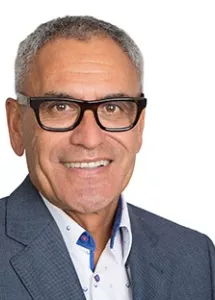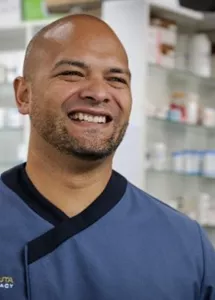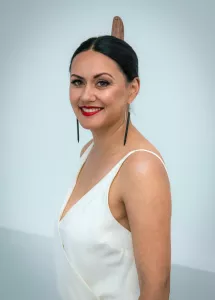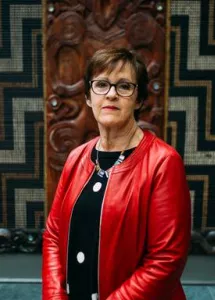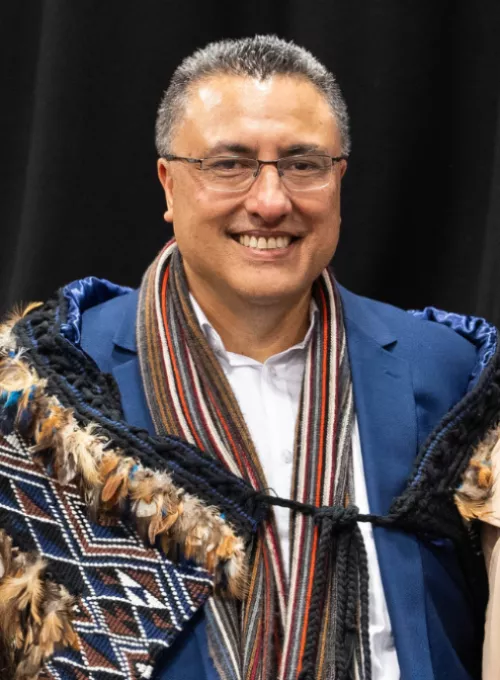
Riki Nia Nia is the Chief Executive of Te Rau Ora and leads the implementation of their vision of ‘Manamotuhake o te whānau hei oranga mo ngā uri whakatipu’, a future where whānau have the autonomy to ensure the wellbeing of future generations. Riki implemented the new Toitū Hauora Podcast series where he talks to over 20 of our countries well known and emerging Māori health leaders. You can listen to both seasons of the Toitū Hauora Podcast.
Riki has received mentoring and guidance from some of our countries most capable and respected Māori Leaders, such as Professor Sir Mason Durie, Dame Naida Glavish, and Kara Puketapu and Jean Puketapu.
Riki is most passionate about seeing more Māori enter careers in the health workforce, particularly in leadership roles. He strongly believes this will provide the necessary intelligence, commitment and capability the system requires to perform more effectively for whānau.
Over the past 26 years, Riki has worked in health leadership roles across the health sector in Aotearoa, New Zealand and is well known for his values-based and supportive leadership style. Prior to taking up the Chief Executive role at Te Rau Ora, Riki proactively supported the transition of the reforming of the New Zealand health system in 2022 by holding two senior roles in Te Manawa Taki (Midland Region), covering both the Interim Regional Director Te Manawa Taki of Te Aka Whai Ora and Co-District Director of Te Whatu Ora Waikato. The only health leader in the country given the opportunity to do this.
Prior to this, Riki was the Executive Director of Māori Health, Equity and Health Improvement and Deputy Chief Executive Officer at Waikato District Health Board (now known as Te Whatu Ora Waikato). In recent times, Riki played a significant leadership role in ensuring our countries response to the Covid-19 pandemic was effective for our Māori communities. Between 2020-2022, Riki led the Covid-19 responses by Tumu Whakarae nationally (2020), Northern Region Māori health (2020) and Waikato Māori and Public Health (2020-2022). Riki was also a member of the National Māori Pandemic Expert Advisory Group for the Ministry of Health (2020 onwards).
Riki has worked diligently with discipline, compassion, and integrity to make a wide and impactful contribution to Māori health and Māori health leadership in our country and to the development of international indigenous health networks. He has been involved with promoting relationships with First Nations leaders from across Canada and the USA and applying these learnings to the New Zealand health system.
Riki served as the Chair of Tumu Whakarae (Combined DHBs Māori Health Leadership Group) from 2013 to 2020 whilst holding executive leadership roles at Capital and Coast, Counties Manukau, and Auckland and Waitematā District Health Boards. Examples of Riki’s leadership contribution to the development and implementation of solutions to improve Māori health outcomes are captured in the 2020 Tumu Whakarae Chairs handover Report. His expertise and experience have also led him to be the Chair of Te Mana Taneora o Aotearoa – Māori Men's Health Coalition, Chair of Waka Hourua National Māori and Pacific Suicide Prevention, and a member of the Australasian College for Emergency Medicine Māori Health Equity Expert Advisory Group.
Riki attributes his leadership style and commitment to the health of our people to his upbringing. His grandparents and parents have all been in roles focused on serving their communities. Riki’s father was the late Reverend Canon Huatahi Nia Nia (Tūhoe, Ngāti Kahungunu) was the first Māori chaplain at Gisborne Hospital and served the Tairawhiti for over 30 years as an Anglican Minister. Riki’s mother, Theodosia Nia Nia (Tonga), was the first Tongan citizen in Te Tairāwhiti, a life member of the Māori Women’s Welfare League and has been recognised for her contribution to the growth and support of the Tongan community in Te Tairāwhiti.
"I believe every engagement we have with people should be a hiki wairua engagement. We should always aim to have a positive impact on the wairua of others or, at the very least, do no harm to another person’s wairua. This should also be a fundamental aspiration of the health system. When all whānau engage our system, they should feel heard, supported, valued and safe. Our whānau should not have to contort themselves or their values to access our countries health services - Riki Nia Nia."
Riki has completed a Bachelor of Social Work and Social Policy (Hons). Double Major in Sociology and a Master of Philosophy - Māori Studies through Massey University. He is looking forward to recommencing his PhD in Indigenous Health Leadership when time allows, after placing this on hold in 2020 to help the national response to the COVID-19 pandemic.
Links:
Riki Nia Nia appointed as new CEO of Te Rau Ora
Te Aka Whai Ora - Māori Health Authority regional directors
Waikato DHB systematically failing Māori and Pasifika
Role Call - People on the move and gaining recognition in the health sector
Updated 27 January 2025
